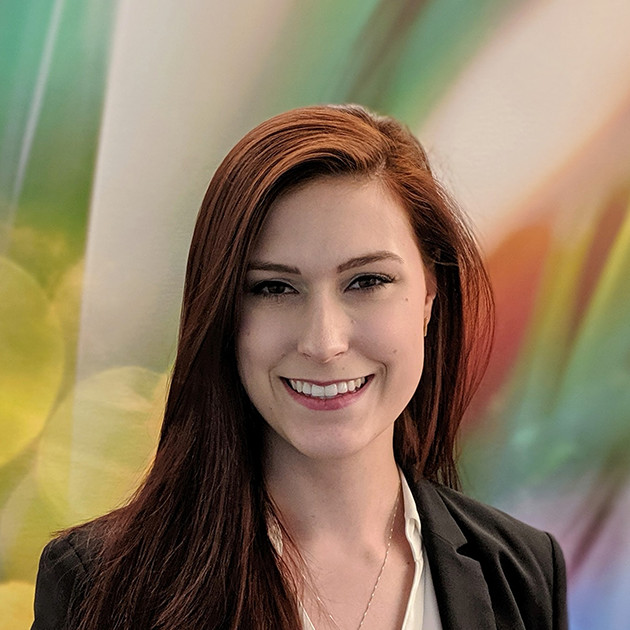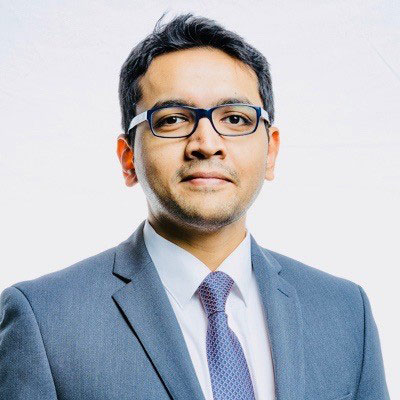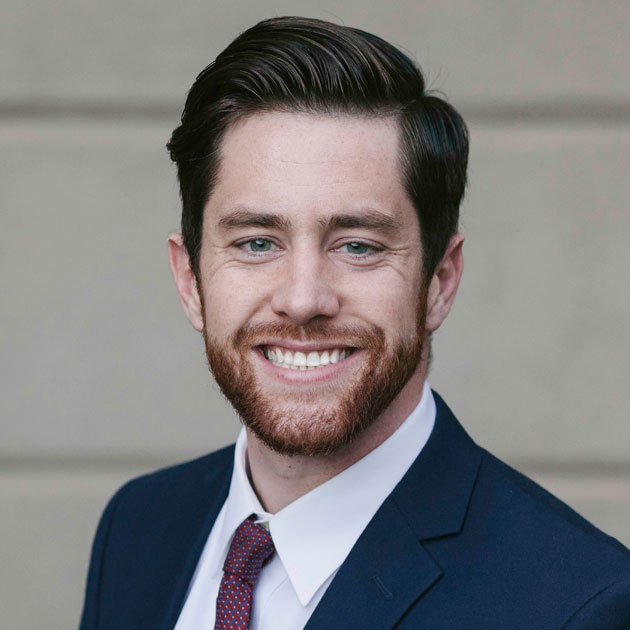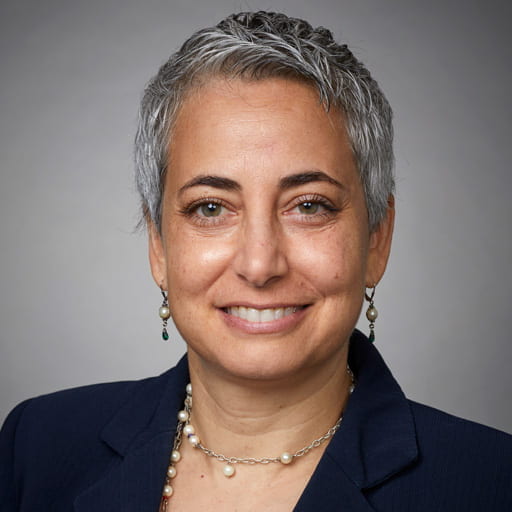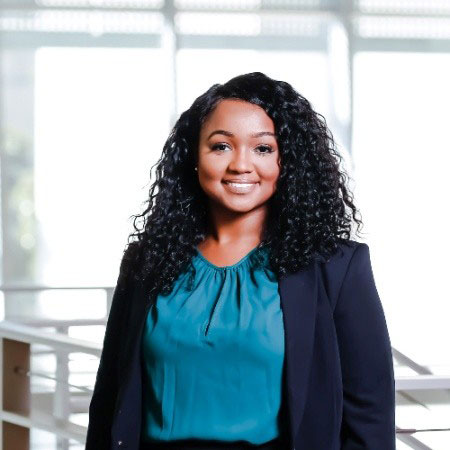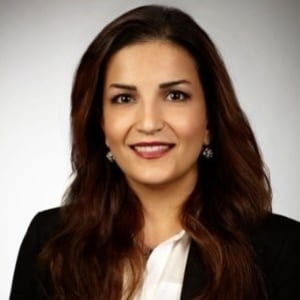
Newsha Mirzaie, MBA’16, a senior strategy and operations management consultant at Deloitte, joins Dr. Monica Powell for a chat about why she chose UT Dallas over other local universities to pursue her MBA degree. They also discuss how her education at the Naveen Jindal School of Management was a great return on her investment — not only in terms of recouping tuition costs but also for learning business, and life, lessons.
Transcript
“Soft music begins to play…
[Jimmie] This is yet another MBA G.O.A.T. a podcast featuring conversations with a greatest of all time MBA alumni from the Naveen Jindal School of Management at the University of Texas at Dallas. We’re here to celebrate the outcomes of graduate management education and to identify remarkable examples of how the MBA program here at the Jindal School has transformed the lives of our alumni. Now, here’s Dr. Monica Powell senior associate dean and graduate dean at the Jindal School. Take it away, Monica.
[Monica] Well, hello there. This is Monica Powell. I’m the senior associate Dean and graduate dean at the Naveen Jindal School of Management at the University of Texas at Dallas and boy, am I one excited Dean this afternoon. It is such a pleasure to have Newsha Mirzaie with us. Newsha is a senior strategy and operations management consultant at Deloitte, and I want to tell you she gives UT Dallas a lot of credit for that achievement. So welcome to yet another UT Dallas MBA G.O.A.T. , Newsha.
[Newsha] Thank you. Hi everyone!
[Monica] You know I am here in Dallas, and you are in California.
[Newsha] Yes.
[Monica] So it’s a long way from your Texas roots, Newsha.
[Newsha] I know Orange County – Orange County two hours’ time zone away.
[Monica] Wow. Well, you know, I am so thrilled that we have you on the on the G.O.A.T podcast today. One of the reasons that I’m so excited about that is that you fit the profile of exactly why somebody goes and gets an MBA, you know. You got your undergraduate degree outside of the country, and then I think you came and went to the University of Texas at Austin and then you came here for an MBA. And since you got your MBA, which was only by the way four years ago, not very long, you have had the opportunity to work at two fabulous consulting firms. So can you share with our audience this afternoon how the MBA program at UT Dallas really helped you launch that consulting career?
[Newsha] Oh, yeah. Absolutely. My pleasure to give back to the whole UT Dallas community and any potential prospect student who are seeking to change their life and career for better opportunities. My career, I started as an architecture engineer in Iran. And in 2009,I immigrated to the US attended UT Austin where I got my Master’s Degree in Urban Design and Planning, graduated in 2011 with the worst job market ever. We can’t say that was the worst because we’re going to face another wave possibly as we are facing under the implication of COVID these days, but it came out when you know, no one was hiring. I was I’m like all companies were on hiring freeze, and I needed sponsorship and the rest of the complications for an immigrant. I was lucky that I landed on one of the top architecture and design firms in Dallas, and I moved to Dallas right after school. [03:37] And um, like, you know, all the job and life goals that I had and my mind still that job wasn’t that brain stimulating enough for me, and I was not aligned with my goal for my future in life. So I started digging and researching about what can change my life, and I knew that I’m not going to go to medical school. It’s kind of late for me to start off engineering, education or something like that, so business was the best bet for me.
[Monica] And then you chose us.
[Newsha] Yes
[Monica] I mean over all, I guess over all of the competitive options that you had in the marketplace you come and really change the trajectory of your career. So what was it about UT Dallas that gave you this idea? Hey, if I go do this and, and move away from what I’ve been doing technically and I go get this degree. How is this going to launch these two great jobs at EY and Deloitte both in the last four years since you came to UT Dallas. Can you share a little bit about how you chose us?
[Newsha] Yeah, the reason I chose UT Dallas is first the whole UT system, so I had a degree, and I had the experience of University of Texas at Austin. So I knew already UT system. My second element was return on investment. So UT Dallas is a great school, but relatively a high ranking in MBA when you check it on US News and among other competitors. It’s not an Ivy League. We all know that but outside of the Ivy League, It’s, it’s a good school with a good reputation compared to other competitors to UT Dallas. SMU was my next option, but financially that was not a viable option at all. And SMU’s ranking versus UT Dallas.
when you check it on US News and the rest of them is not making a huge difference. So I thought maybe it doesn’t work paying double the tuition to go to SMU vs. when I have the option of going to UTD. So I chose UTD. I don’t want to name the rest of the options available in Dallas because for me the two major options that I considered were SMU and UTD, and UTD outperforms SMU in terms of return on investment and the quality.
[Monica] Newsha, we love that UT Dallas outperforms. In fact that maybe the headline for the entire podcast.
[Newsha] Laughs….
[Monica] So I was told by a little bird that when you were in the MBA program that you just were not going to settle for anything less than the career that you wanted. So, can you tell us a little bit about that crusade that you had to make this incredible career happen for yourself and what role did we play in helping make that happen?
[Newsha] So when I first talked with Shawn Alborz
[Monica] So Shawn Alborz, who is now our associate dean for undergraduate business education.
[Newsha] Yeah, he’s supported me a lot in terms of giving me information about the whole cohort system. And, I, uh, was a little bit hesitant if it’s a doable option working full-time and coming to school full-time in the afternoon, and Shawn told me that it’s very much doable. People do that, people have kids they do it, you can do it, so he encouraged me a lot. I was like Shawn, I don’t even know the business dictionary, business very basic business verbiage if you tell me dividend, I don’t know what a dividend is and I learned that and under my MBA and he said we don’t we , are we going to teach you all of this. And I was like, okay if I’m going to business school if I’m going to sweat a lot to make this happen want to be a Management Consultant and one of my friends at that time she had just started at Deloitte. She had changed from career. She went to UNC got her MBA and she landed a management consulting position at Deloitte and she told me about this whole management consulting career and I was like, this is the best fit for me. This is enough brain stimulating. This is like solving puzzles. In the business world this is being doctors to businesses. This is what I want to do and I am ready to invest this kind of money and time and effort to harvest management consulting career after two years.
[Monica] It’s an amazing story. I mean people, you know, you read The Wall Street Journal and Forbes and you talk about the prospective candidates that choose the Wharton School or Stanford or Columbia and they’re all in pursuit of a management consultant position and now four years out from the degree, you’re a senior strategy and operations management consultant for Deloitte. So I’m kind of curious when you’re solving all these puzzles and figuring out all of these complicated problems and solving them for your client, how often do you reflect back to what happened in the classroom? And can you think of a couple of examples? That wow, I think about this all the time.
[Newsha] All the business cases we had of the homework. So that’s management consulting. So there are during the core MBA courses, you’re given Harvard Business cases and we team up but, but classmates and we started like, okay what the, what the situation is? What kind of problem you’re solving? What kind of data we need what results the processors is expecting us to produce? That’s my day-to-day life at work. So all those business cases we were solving for and core MBA courses. That’s, that’s management consulting it every single day at takes me back to those classrooms at UTD.
[Monica] You know, we always tell brand new MBA students and I know you probably remember this, that you know you can learn how to solve a problem but half of the battle is solving the right problem.
[Newsha] Yeah
[Monica] And then saying to your being able to answer that question of your clients, when they say well, so what if you found all this data. I imagine in your role now for your clients, you’re thinking back to how to identify root cause problems and how to be able to solve the right problem for them.
[Newsha] Yeah, yeah, exactly like when we go to the client. They know what their pain points are but they don’t know what exactly is going wrong — that the business is not working smoothly. As it supposed to be it’s either an implication of, they’ve either gone through a merger and acquisition or the cost is high or their program management is not aligned with their corporate goals. A lot of that.
[Monica] So that must be really fun. I mean, Newsha, you must have fun every day. I mean an MBA student would probably say, I don’t want to have case homework every day, but you’re living case homework every day,
[Newsha] Every day. Yeah, yeah, you don’t know the problem is, until you start conducting multiple rounds of interviews with different stakeholders, you got to identify who’s the right person to talk to and they throw the information at you and you know sometimes the detectives that you that you watch in that place those kind of shows that they pin a bunch of photos and notes and they start connecting them together to solve the whole problem and come up with some sort of resolution that’s what we do in management consulting. So we are in front of the whiteboard writing stuff and grouping them then pinpointing to come up with resolution and completion.
[Monica] Well I know I’m addicted to NCIS and Law and Order and forensics shows watching how they kind of pin that all together, when you think back on the MBA program, what was your favorite course?
[Newsha] Ummm. Financial Management.
[Monica] Oh wow. So a very a very early course.
[Newsha] Yes, yes, semester two that one and operations management is, you can tell then my, focus was my MBA concentration was major finance minor operations.
[Monica] Did you ever think that you were going to fall in love with finance when you started the MBA program?
[Newsha] I fell in love with finance. I’m fascinated by numbers, to be honest, like people tell me that you chose the wrong career architecture, doesn’t, did not have enough math for you. I was very strong in math. In high school, I liked arts and like creation, but back at that time data did not look as fascinating as it is right now if people did not know that data could be a creative piece on a level can generate insights on some products out of the data back in the day when I was in high school, so I chose architecture to feed my brain with creation building something, but they’re not an automatic for me but finance has enough math, not technical math, but the kind of math that you generate insights to make your personal life and business, working better for you.
[Monica] Wow that’s terrific.
[Jimmie] Midroll ad: This episode is brought to you by the UT Dallas MBA program, top-ranked nationally and in Texas.
The UT Dallas MBA combines a robust core with 13 concentrations. You have an option to add a second master’s degree. Your choices for that include five STEM-designated programs.
The MBA program has full-time, part-time, online and other formats. They give you flexibility to fit your MBA education into your busy schedule.
The skills and training you will receive are what top employers are looking for.
For more information, visit us online at jindal.utdallas.edu/mba where you’ll see a totally redesigned, brand new website! We’ve highlighted students in a variety of our MBA programs. You’ll learn all about their experiences, see their videos and really understand the full impact of the MBA programs at the Jindal School at UT Dallas.
[Monica] Has the impact of COVID-19 changed how you’re doing work as a management consultant?
[Newsha] You know their whole travel part of management consulting some people like that some people don’t. I love the traveling part of it. It’s very brutal, to kind of hard to balance your work life this sometimes I’m living in the LA area. Sometimes my clients are in Boston or Hartford so the flight are like seven, eight hours each way every week. On their COVID – I am not flying that means so I’m being more productive in terms of using my time. But there is a challenge of if you don’t see the client face to face and you have to run those workshops and interviews, it’s kind of hard to engage people on the other side of the camera slash computer and for every single. You know messaging you want to send to the clients, either a meeting or then people are not available for the meeting and then you have to type every single word you want or make a phone call. So that’s the frustrating part of that. But there are both goods and bads but one one good thing about the whole consulting career is it’s very flexible.
[Monica] Absolutely
[Newsha] I would barely go to the office work from home already before before the COVID started when we were not a client we were easily working from home.
[Monica] Wow
[Newsha] When the COVID started it did not impact us much in terms of work style, just the travel part got cancelled but the flexibility of work style and consulting is very makes it very resilient to incidents like COVID or similar risks to that.
[Monica] So, if you were going to talk to a prospective student that came out of another highly technical background that wanted to be a leader in an organization, evolve above, managing the real technical, so that they’re driving strategy. What would you say to them, what would the arguments be to invest in an MBA? I mean you did it the hardest way. I always tell incoming students that if you’re going to be in our evening cohort program or evening flex program that is absolutely the hardest way to get an MBA, because you are you know you’re juggling a family you might be juggling a spouse or a partner, you’re juggling travel, work, you’re kind of doing it the hardest way. So, what would you say to that prospect about why this is really worth the time and effort and the sacrifice?
[Newsha] Actually coming from a heavy technical background to MBA to switch careers more in toward leadership position is the greatest fit these days as far as I’m seeing from the management consulting perspective. Successful people I know say successful people that say successful profile that makes finding job easier and management consulting for people, those are people who are coming with the background and accounting and finance and BBA or coming from technology, computer science, coding , IT, Information Management System. Those are the basic, a bread and butter career route, business consulting these days even, even in the strategy part is going more toward technology, there is a lot of enterprise system implementation going around that needs someone who knows both enterprise management building blocks, and technology building blocks so MBA gives you the knowledge that what process improvement is like how to realign and enterprise processes on the technology side. What are the building blocks for designing an ERP system or implementing an ERP system to let those processes happen automatically automating those processes automation comes with your technology background, processes come with your MBA, and that’s a golden combination and I think those kind of people will be very successful at least in the management consulting work.
[Monica] So while you were in the program, Newsha, did you, did you have an opportunity to kind of connect and make friends while you were in the program? People that you stayed in touch with in the last four and a half years?
[Newsha] [18:52] Um, yeah. Actually, I was in Portland for a client with Deloitte a year and a half ago, for a long time, year and one year, and I figured that Josten, who was my cohort, he’s moved to Oregon, and he’s living there. And I stopped by at his house but they had a little cute baby, and I had dinner with them and then couple of weeks after I learned from Josten that he ran into my sister who was his neighbor and, because the local life, Josten was like oh, it’s you again. So yeah, I’m definitely in touch with my cohort.
I have him on Linked-in, so we can talk about that how I landed on a job at EY that happened at UTD. So one of my classmates helped me to make the connection to land at EY. And find myself an opportunity for management consulting at Ernst and Young.
[Monica] So we tell students all the time that an MBA is partly about knowledge and mostly about networking.
[Newsha] Mostly about networking.
[Monica] Yeah, so it sounds to me that because of the relationship you had with your classmates that they helped you engineer, your change of direction into management consulting and without, without, that kind of connection that might have been much more difficult to make happen.
[Newsha] Or even impossible.
[Monica] Wow
[Newsha] Yeah
[Monica] So when you look back and imagine you know, you might have had a family while you were in the program working like crazy going to school like crazy. What was your drink of choice, while you’re in the program? Did you drink eight million cups of coffee? Did you drink 10 million cups of coffee or were you a diet Coke crazy? How many cups of coffee did you drink in the program?
[Newsha] Yeah coffee and tea even though I preferred wine and tequila at that time, but believe it or not, I’ve dropped 10 to 12 pounds weight over over my MBA program because I was not drinking alcohol, because I needed my brain to work for me perfectly 24/7. I was either at work or at school, or I was doing homework, so my go to type drink was coffee and tea.
[Monica] That is so, Newsha, that is so funny because I can just see our new marketing campaign enroll in a tough MBA program to achieve weight loss.
[Newsha] Yeah….don’t….don’t tell them that they may need a face lift because literally under the pressure of not having enough sleep and being stressed out and you know the rest of it. I keep making fun of my photos telling my friends that I have before and after MBA photos like I aged, and why I really lost weight.
[Monica] So an MBA program that lands you a great career that helps you lose 10 pounds but requires that you then get a facelift, yeah tell people about that part.
[Newsha] Yeah
[Monica] Who is your favorite professor in the program and why?
[Newsha] So my financial management. What’s, what’s her last name, Reichert?
[Monica] Oh, Carolyn Reichert.
[Newsha] Yes, I love her, I miss her a lot. I still like look back, and like flip through my notes from my class.
[Monica] Well, it sounds like you had an incredible journey and an incredible experience. If you were to play with me a little bit and kind of fill in the blanks a little bit I’m going to ask you some sentences.
[Newsha] Okay.
[Monica] What specifically do you credit UT Dallas with in helping you achieve your career aspirations?
[Newsha] Keeping me a hopeful, all the time that I was so down and pessimistic about reaching my goals. I give that credit to Lisa Shatz and Fiona Hunter, both.
[Monica] So, Lisa Shatz, the assistant dean for MBA, programs and Fiona Hunter, who’s the associate director for the Career Management Center. They kept you plowing away.
[Newsha] Yeah, Lisa was like, do this on that, it’s hard but you get that but she reviewed my resume multiple times and she was like you get it. This is not impossible, you want to manage my consulting you get there do this and that and I promise that it will happen. And it happened. She was pushing me not to not to lose my hope.
[Monica] Wow, that is that’s, that’s really quite a great compliment, not only to Lisa but to, to the program. So Newsha, what would you, what would you want to say to somebody that would want to argue in today’s environment that an MBA isn’t worth the return on investment? What would be that catchphrase that you would say back to them to make them reconsider?
[Newsha] It depends what kind of career they have and what their expectations are from their MBA. So, ‘return on investment’ has two fold. It’s either return on investment on your tuition. So you pay $50k-$60k, if it’s going to push out all your payroll to, I don’t know, making double or triple, certainly do that. The other aspect of return on investment, as I always call MBA lesson for life. This is basically not for business. This is MBA structures, the way you think about any decision you’re making in your life that’s either, you know, working on your on a legal case for yourself or you want to buy a house, you want to make a personal investment on the side, any decision making you have, you’ll have MBA teaches you to think structurely. That’s the return on investment, I think.
[Monica] What do you miss most about being in school?
[Newsha] Aside from seeing people in my life, just the school school , to be honest, I’m very much happy that I’m done with school. It’s not about UTD , but it’s about studying I have three graduate degrees, and I think when I got my MBA, I said, I’m done. I’m not going to go back to school anymore.
[Monica] Newsha, I would say you’re a bit of an overachiever but that overachievement is certainly paid off.
[Newsha] It did it then and MBA for sure.
[Monica] Well, you just, you sound like you have accomplished and you are so satisfied with the outcomes that you achieved as a result of making the choice to come to UT Dallas and do the, the absolute hardest MBA program option that we have, if you are going to give a verbal commercial for the UT Dallas MBA program, what would you include in that commercial?
[Newsha] Hmmmm I say, I get back to return on investment. It is very hard because yeah Dallas is a great city, the whole DFW is a great job market. It’s a great city, finding a good school with that quality with $50-$60k in tuition is next to impossible somewhere else, or at least to my knowledge, return on investment is the best you get for your buck at UTD.
[Monica] Well, I can’t argue with that for sure Newsha it has been a pleasure to have you on yet another UT Dallas MBA G.O.A.T. and of course stands for greatest of all time. And when I look at somebody that came into a program made their mind up to change where they wanted their life to flow. You nailed it! And so congratulations to you for your hard work for your achievement. And most of all, thank you for giving UT Dallas credit. And, at least for a part of what has made you so terrific at your job at Deloitte Consulting, so I will remind the audience that Newsha Mirzaie is at Deloitte Consulting as a senior strategy and operations management consultant that ‘creme del la crème’ job that most MBAs want to get and you have accomplished so much, and we are so proud of you.
[Newsha] Thank you very much. It’s always a pleasure to give back to my UTD community for sure. If I’m ever in the Dallas area definitely I will stop by to say hi to all of you. I don’t know how soon we can hug each other but definitely I mean, from all of you because UT Dallas changed my life forever.
[Monica] Well we love that. Thank you so much, Newsha and, and then also khodafez (a parting phrase in the Persian language).
[Newsha] Khodafez (laughter).
[Monica] Thank you so much for listening to today’s podcast. I hope that you were inspired by the words you heard from one of our greatest of all time, MBA G.O.A.T.s. If you were inspired to think about getting an MBA degree, I hope that you will be in touch with us. Give us a call, drop us an email, hop on our website. Be in touch with us so that we can help you make a difference in your future. We look forward to hearing from you.
[Jimmie] Thanks for listening to this episode of yet another MBA G.O.A.T. podcast. Join us online at mbagoat.com to find episode notes, links and more. Be sure to subscribe to yet another MBA G.O.A.T. podcast on Apple Podcasts or your favorite podcasting app. If you like what you hear, please leave us a five-star review. That will help spread the word about the podcast and the Jindal School’s MBA programs. To learn more about the Jindal School’s MBA programs, go to jindal.utdallas.edu/mba
(Music continues)

